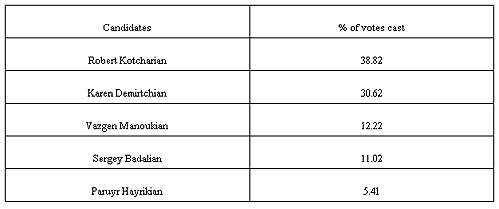Analysis
News
Corinne Deloy,
Fondation Robert Schuman,
Helen Levy
-

Available versions :
EN

Corinne Deloy
Fondation Robert Schuman
Helen Levy
Twelve years after independence (by referendum on 21st September 1991), Armenia will elect the fourth President of the Republic on 19th February. According to the 1995 Constitution the President, who is elected by direct universal suffrage, enjoys numerous powers. He ensures the successful running of the executive, the legislation and the legal systems. He is Commander in Chief of the army and the guarantor of territorial integrity and the country's security. He has the right to dissolve Parliament.
Officially there are eleven candidates standing for the election on 19th February:
Robert Kotcharian, outgoing President;
Stepan Demirtchian, leader of the Popular Armenian Party, son of Karen Demirtchian, former president of the National Assembly and candidate in the Presidential election on 16th and 30th March 1998, who was assassinated on 27th October 1999 (when armed men attacked Parliament killing the Prime Minister and six other politician as well as the President);
Vazgen Manoukian, the National Democratic Union candidate, who has stood twice in the presidential elections (1996 and 1998) and former Defence minister;
Aram Sargsian, leader of the Democratic Party;
Aram Sargsian, namesake of the latter, leader of the Party of the Republic and former Prime Minister;
Aram Karapetian, political analyst, president of Perspective, Centre of Strategic Initiatives;
Artaches Guegamian, leader of the National Unity Party, MP and former mayor of the capital Erevan (during the Soviet era);
Vladimr Darbinian, leader of the Armenian Communist Party (HKK) ;
Garnik Maragrian, candidate for Mother Country and Honour;
Aram Aroutiounian, candidate for National Entente;
Rouben Avaguinian, candidate for United Armenians.
The electoral Commission refused the candidature of Aram Raffi Ovannissian, a former American citizen living in Armenia for over ten years but who only obtained Armenian nationality in 2001; the Constitution obliges any person standing in a presidential election to have been a citizen for a minimum of ten years. Each candidate must also be a minimum of 30 years old and register 35,000 support signatures with the electoral Commission along with a deposit of 5 million drams (approximately 10,000 euros).
The Nagorny Karabakh conflict
The Nagorny Karabakh conflict has been poisoning Azerbaijani-Armenian relations for decades. This mountainous area of 4,400 km2, inhabited by 150,000 people that was part of Armenia until 1923 when Stalin decided to merge it into the Socialist Republic of Azerbaijan granting the status of autonomous region - is today an Armenian enclave within Azerbaijan. Nagorny Karabakh proclaimed its independence on 10th December 1991, a declaration that was simultaneous to the break up of the USSR and that also provoked a war between the Azerbaijanis and Armenians in the region supported by Erevan; this caused 30,000 deaths and hundreds of thousands of refugees.
In 1993, the Armenians took back a "security zone" of 8,000 km2 that lies between their country and Azerbaijan. A cease fire was signed in May 1994 but no diplomatic agreement has been drawn up since. The negotiations led by the Minsk Group of the Organisation for Security and Co-operation in Europe (OSCE), co-chaired by France, Russia and the USA have not managed to lead to a peace agreement. The Armenian and Azerbaijani presidents, Robert Kotcharian and Heydar Aliev have met on several occasions to try and end the conflict. The most recent of these meeting s took place in Prague in November 2002 during the NATO summit.
Former President Levon Ter-Petrossian who was forced to resign in 1998 partly due to pressure from Robert Kotcharian amongst other things and also because it was said he was making too many concessions to Azerbaijan on the Nagorny Karabakh conflict, planned to come back to the political arena and present himself as a candidate in the presidential election on 19th February; he finally gave up this idea after having spoken about it with several foreign ambassadors in Erevan. The present President Robert Kotcharian, who was in favour of taking a hard line with Azerbaijan for a long time, is experiencing problems since he only has a 20% positive opinion rate in the polls. As the presidential election approaches the President is trying to rally the Armenians to his cause, and declared on 17th January, on his return from a visit to Germany "that Armenians and Azerbaijanis were ethnically incompatible."
The campaign for the presidential election started on 21st January.
For Armenia 2003 will be a general election year: three months after electing their new President Armenians will renew their Parliament on 25th May.
Reminder of the results of the presidential election on 16th and 30th March 1998
First round 16th March 1998:
Participation : 65%
 Source Central Electoral Commission of Armenia
Source Central Electoral Commission of Armenia
Second round 30th March 1998:
Participation : 68.14%
 Source Central Electoral Commission of Armenia
Source Central Electoral Commission of ArmeniaOn the same theme
To go further
Elections in Europe
Helen Levy
—
24 February 2026
Elections in Europe
Helen Levy
—
10 February 2026
Elections in Europe
Corinne Deloy
—
20 January 2026
Elections in Europe
Corinne Deloy
—
13 January 2026

The Letter
Schuman
European news of the week
Unique in its genre, with its 200,000 subscribers and its editions in 6 languages (French, English, German, Spanish, Polish and Ukrainian), it has brought to you, for 15 years, a summary of European news, more needed now than ever
Versions :


